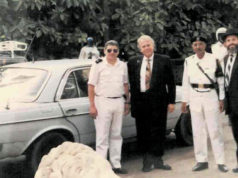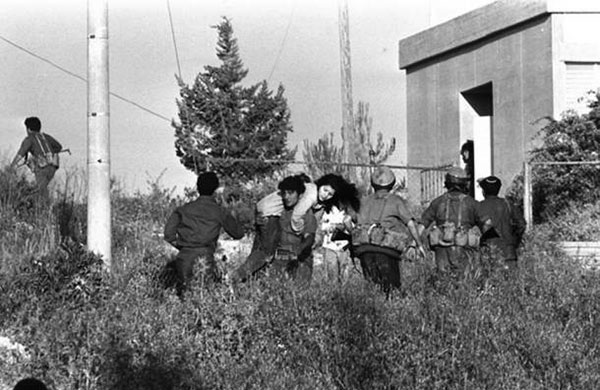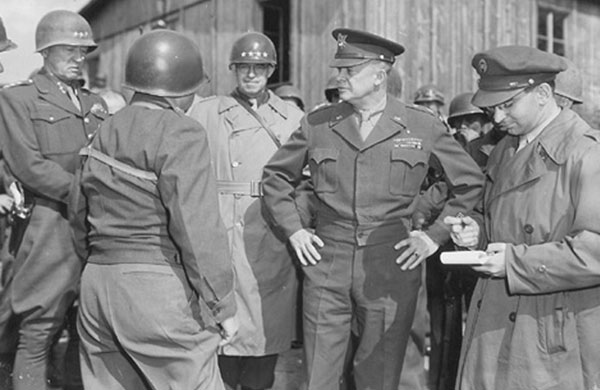 Rafael Eitan was a leading figure in the Israeli Defence Forces (IDF), of which he became Chief of Staff. He later entered into Israeli politics. Stocky, wiry and determined, with sharp, square features, Eitan knew no fear, and, as a field commander, always inspired confidence in the men he led.
Rafael Eitan was a leading figure in the Israeli Defence Forces (IDF), of which he became Chief of Staff. He later entered into Israeli politics. Stocky, wiry and determined, with sharp, square features, Eitan knew no fear, and, as a field commander, always inspired confidence in the men he led.
He was born Rafael Kaminsky at Moshav Tel Adashim, a co-operative farming village in the Jezre’el Valley in January, 1929. His father was a warrior of the Shomer organization, and made sure to give Eitan and his brothers and sisters a strict education. By age 7, Rafael already knew how to use a gun. At the age of 16, he joined the Palmach.
During the War of Independence, he joined the Harel Brigade in the role of platoon sergeant and fought in the battles to liberate Jerusalem. In one of those battles, he was severely wounded. At the end of the war, he served as a First Lieutenant Company Commander, though he had never had any official officer’s training.
After the war, Eitan left the army and returned to Tel Adashim. He rejoined the IDF after a friend reproached him, saying, “The Arabs are killing Jews and you are milking cows.”
A year later, Eitan was given command of a paratrooper platoon. This was in 1955, during the “retaliatory actions period” in which Israeli military units would cross the Egyptian border to tackle enemy forces on their own land. During this time, Eitan led an attack against the Egyptian forces at Kuntila, the first attack of its kind behind enemy lines. During the assault, he stormed the enemy position at the top of a steep cliff ahead of his batallion and singlehandedly destroyed an enemy firing position, allowing his troops to overtake the area. For this action, he received a special IDF decoration for courage.
During the Six-Day War in 1967, Eitan led his paratroop brigade in Sinai to the Suez Canal. He was shot in the head, but survived. He recovered and returned to full service after the war.
Later, on December 26 1968, the PLO attacked an El Al aircraft in Athens, killing one passenger and wounding another. Eitan led his paratroopers in a daring operation in response. This operation was aimed at putting pressure on the Lebanese government to stop terrorists, many of whom were using Lebanon as a base from which to attack Israel and Israeli targets worldwide.
In 1973, Egypt and Syria launched a simultaneous attack on Israel. The Commander of the Northern Front, Yitzhak Hofi, placed the defence of the Northern part of the Golan in the hands of Eitan who, from his underground command bunker at Nafekh, was in a better position to control and direct the battle. Trapped in the bunker, and surrounded throughout the first night by Syrian tanks, Eitan directed the battle with cool leadership until the Syrians were pushed back.
Eitan was then appointed head of the Northern Command. He played a key role in the decision in 1975 to create and train the soldiers of the South Lebanese Army under Major Sa’ad Hadad. In August 1977 he was made Chief of the Operations Branch at General Staff, and eight months later he was appointed Chief of Staff. A man of few words, at the ceremony to install him he limited himself to a 20-second acceptance speech.
Considered more a fighting soldier than a planner, each of Eitan’s promotions had been regarded as his last, and that he was chosen for the top job was a surprise. But it was felt that, unlike his predecessor, Eitan would devote all his energies to improving the performance of the IDF while leaving politics to the politicians. But in 1978, during the traditional Independence Day interview of the Chief of Staff, Eitan stated that the IDF could not guarantee the security of the state without retaining full control of the Golan Heights, the West Bank and the Gaza Strip. It was the first time that a Chief of Staff had publicly pronounced his own views on so controversial an issue, and there was a wave of public protest, and calls for him to resign. But Eitan had the unswerving support of the right-wing Prime Minister Begin, and his career endured.
In 1979 the Defence Minister, Ezer Weizmann, resigned and, until the 1981 elections, Eitan took over the defence ministry in all but name. With Begin’s approval, he virtually dictated a huge increase in the military budget over the objections of many in the cabinet. This was the start of his political career.
Despite his roots in the Labor movement, Eitan was notorious for his hawkish views and his hostility to the Arabs. After his retirement from the IDF, in 1983, he entered politics, establishing Tsomet, a right-wing political party which united with Tehiyah before the 1984 elections. Eitan was elected to the Knesset, and served as Minister of Agriculture in Yitzhak Shamir’s Likud government in 1990-91.
In the 1992 elections, on a platform of clean government, secularism and support for retaining all of Eretz Yisrael, his party increased its seats from two to eight.
Before the 1996 elections Eitan joined with Likud in a right-wing bloc and, when Benjamin Netanyahu was elected, he appointed Eitan Minister of Agriculture and the Environment and deputy Prime Minister. Within the government, Eitan was a committed opponent of the Oslo accords.
He died on November 23, 2004 when he was overtaken by waves during stormy weather at the port and drowned in the Mediterranean.



